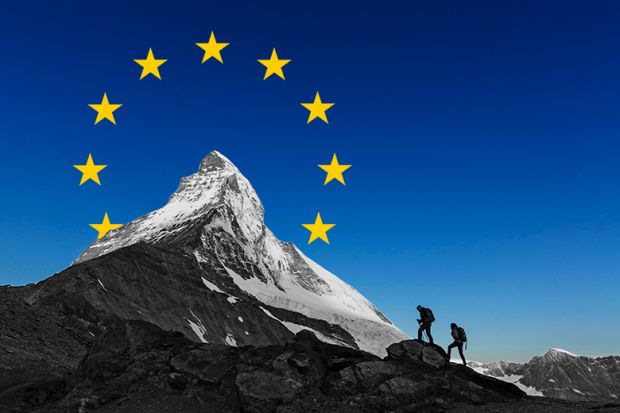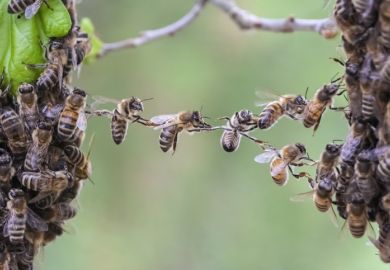For many Swiss scientists, 2024 ended on a happy note that had nothing to do with Christmas dinners or New Year fireworks.
On 20 December, Switzerland’s government concluded negotiations with the European Commission on a “broad package of agreements that aim to deepen and expand the EU-Switzerland relationship” – among them, Switzerland’s long-awaited association to the EU’s latest research funding framework, Horizon Europe.
The agreement will likely bring to a close almost four years of uncertainty for researchers and sector leaders in Switzerland, who have consistently stressed the urgency of Horizon Europe association. Some questions, however, remain: will the period of exclusion have a lasting impact? Could Swiss voters upend the deal? And should science funding be insulated from political turbulence altogether?
Switzerland was barred from association to Horizon Europe when it launched in 2021, after the breakdown of wider negotiations concerning the country’s relationship with the European Union, preventing researchers from participating in European Research Council calls and the Maria Skłodowska-Curie Actions, among other programmes. Even more frustratingly for the country’s highly regarded researchers, it was the second ban in under a decade: in 2014, Switzerland was prevented from associating to the previous framework programme, Horizon 2020, after voters responded to Croatia’s accession to the European Union by passing a referendum motion to restrict immigration from the EU and the Swiss government declined to sign a protocol extending free movement to Croatians.
In both cases, exclusion from Horizon Europe was cause for significant alarm: according to Switzerland’s State Secretariat for Education, Research and Innovation (SERI), the EU’s framework programmes were the second most popular funding source for scientific research, topped only by the Swiss National Science Foundation (SNSF).
The government quickly set up national funding calls to replace the lost framework resources – but while the money may have compared, the prestige did not. National calls lacked “competition at the highest level”, said Maryline Maillard, head of EU and international affairs at the ETH Board, the umbrella organisation for ETH Zurich, EPFL and four research institutes. Laure Ognois, SNSF’s head of international affairs, echoed Maillard: “In terms of careers, it’s clear that having a grant from the real European Research Council is much more important than getting a national grant.”
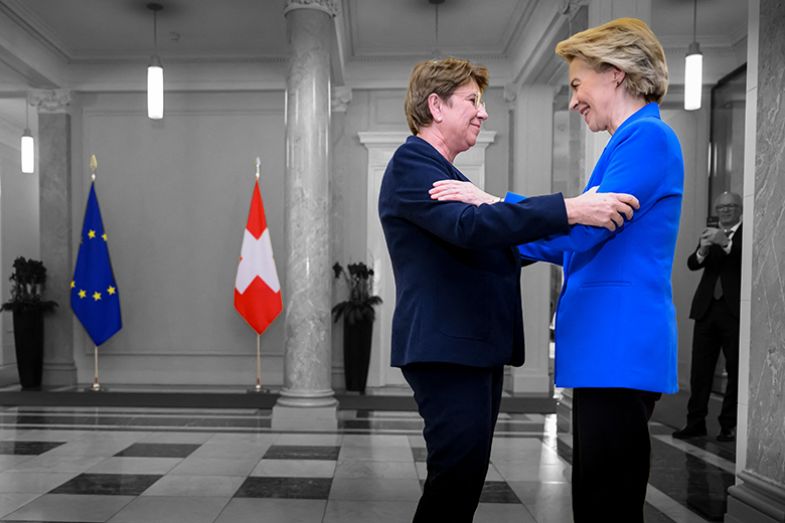
Without the ability to receive ERC funding, said swissuniversities president Luciana Vaccaro, some talent has likely turned away from Switzerland. “When people don’t come, you don’t have the statistics, but I have heard many stories about people who had an ERC grant and were considering Switzerland. Rather than giving up the ERC, they preferred to go elsewhere.”
The ban on Swiss researchers leading EU-funded consortia also degraded the country’s research, Ognois believes: “Everybody knows in science that participating is good, but leading puts you at another level.”
Swiss universities were still able to participate in collaborative European projects during their Horizon exclusion, with their share of the bill covered by the Swiss government. And École Polytechnique Fédérale de Lausanne (EPFL) saw the level of funding it won for such projects remain stable in 2022, compared with the Horizon 2020 average. However, in the same year, EPFL researchers were invited to be partners in 20 per cent fewer collaborative projects than during Horizon 2020 and a huge 64 per cent fewer Marie Sklodowska-Curie networks, which funds early-career researchers. “The effects of this decrease on the level of funding may be felt from 2023 onwards,” EPFL speculated.
Swiss interest in collaboration also seemed to decline during the country’s Horizon exile. At the University of Applied Sciences and Arts of Western Switzerland, where Vaccaro is rector, the proportion of applicants to Switzerland’s national replacement scheme for collaborative projects who had not previously received Horizon funding was just 10 per cent – during Horizon 2020, the average was 30 per cent.
Nor was innovation spared from the effects of Switzerland's isolation. EPFL pointed to its quantum technology spin-out Ligentec, which moved some of its research and development operations to France in 2022, partly as a result of “the deterioration of the framework conditions in connection with the non-association”. Another quantum innovator, the University of Geneva spin-off ID Quantique, opened a branch in Austria in order to maintain its access to EU programmes.
“Switzerland is a really innovative country, where the ecosystems of basic science and innovation are very closely interconnected,” said Ognois. “And if one part of the system leaves, there are consequences for the whole.”
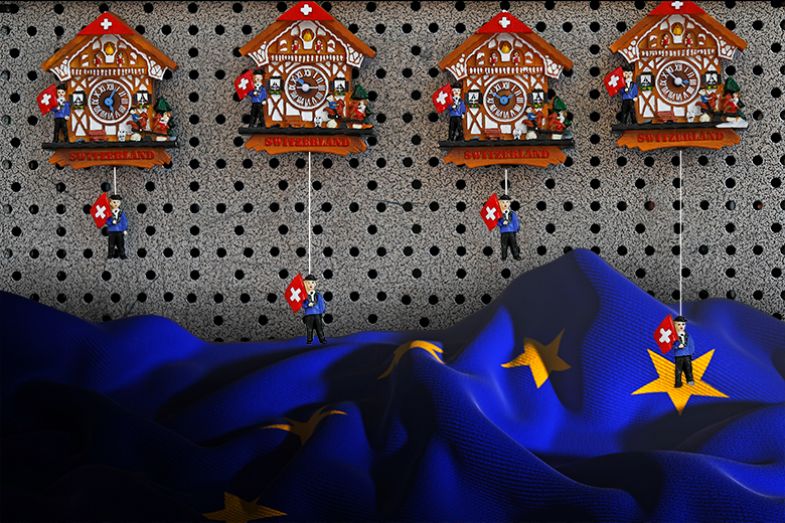
For much of Switzerland’s second time out in the cold, it had a companion: the UK, which saw its own Horizon Europe association negotiations stall amid a dispute with the commission over the post-Brexit Northern Ireland protocol. The countries’ shared exclusion prompted the Stick to Science campaign, launched in February 2022 by ETH Zurich president Joël Mesot, EPFL president Martin Vetterli and ETH Board president Michael Hengartner, alongside the umbrella group Universities UK, the Wellcome Foundation and the Royal Society.
The campaign, backed by bodies including the European University Association, Science Europe and the League of European Research Universities, called for the UK, Switzerland and the EU to “rapidly reach association agreements”, decrying their delay by “political barriers that have nothing to do with science”.
“We realised that the topic of science had been politicised and taken hostage for the negotiations,” the ETH Board's Maillard, the campaign’s coordinator, told Times Higher Education. “We have so many global challenges that need to be solved, and it’s only by being able to work together that science will contribute most to society.
“We wanted to say it loud with the campaign: science needs to be free of barriers, Europe needs to remain globally competitive, and it’s not by blocking collaboration within countries in Europe that this competitiveness can be achieved.” The Stick to Science motto puts it succinctly: “Put science collaboration before politics.”
However, swissuniversities’ Vaccaro is wary of the suggestion that research and innovation funding be ringfenced against any future political disputes.
“This is a difficult question,” she said. “We are part of a system, and I think that this stable relationship with the European Union will profit the prosperity of Switzerland overall. I think all the population should benefit from this stability.”
Christopher Smith, executive chair of the UK’s Arts and Humanities Research Council and UK Research and Innovation’s international champion, also acknowledges the complexity of the situation. “To say that politics and science have nothing to do with each other is difficult because ultimately, science is funded through taxpayers’ money, and the way that we spend taxpayers’ money is the political decision,” he said.
“The really important thing that we need to do as scientists and as funders is to win the political argument. Winning that argument looks like being able to show that the science that we do has an impact on economic growth, on well-being, and on the cohesion of our citizenry.”
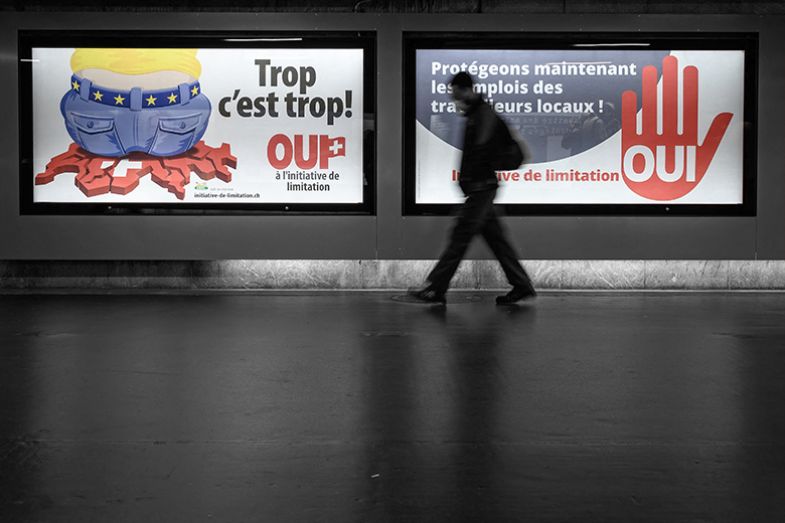
The UK struck a deal to rejoin Horizon Europe in 2023 after the agreement of the Windsor Framework settled the dispute with the EU over Northern Ireland’s trading arrangements, bolstering hopes that Switzerland would eventually associate, too. But questions remain about the effect of exclusion on both countries’ ability to maintain their former prowess in winning highly competitive funding.
Since association had been written into the UK’s Brexit deal with the EU, the country continued to participate during its exclusion in Horizon Europe grant calls, with the UK government funding any awards that were made, notes Smith. “But, clearly, any uncertainty in any system is concerning and can be disruptive.”
Reassociating to Horizon Europe, Smith said, held both “symbolic” and “practical” significance for the UK. “There’s a huge symbolic value in being back in association. It says a lot about our science, our collaboration and our membership of an international partnership. Practically speaking, obviously it gives us access to schemes and funding.”
The UK’s accession issues have had a fairly limited affect on its success rates. It will, for instance, host 38 recipients of the ERC’s 2024 mid-career Consolidator Grants, on par with France and second only to Germany with 67. That figure amounts to 11.6 per cent of all grants awarded in that round. That compares unfavourably with the 50 grants won in 2020’s call: equal with Germany and amounting to 15.3 per cent of all grants (in that same round, Swiss-based researchers won 21 per cent of total grants). However, the UK hosts 18 of the 201 researcher (9 per cent of the total) awarded ERC Synergy Grants in 2024, second only to Germany, with 34. That compares with just eight out of 116 selected researchers (6.9 per cent) in the 2020 call for the grants, aimed at fostering collaboration between outstanding researchers.
The Swiss case is different from the UK’s because its researchers were barred even from participating in the famously stringent selection process for ERC grants during the country’s exclusion. Nevertheless, sector leaders in Switzerland hope that their researchers’ success rates in forthcoming rounds will be comparable to those seen before the country’s latest exclusion, when, despite its relatively small size, it often won more ERC grants than any country but the big three of the UK, Germany and France.
“We have a strong connection to Science Europe, the Global Research Council and other organisations,” the SNSF’s Ognois said. “We are still in contact and working together [with other European scientists]. From that perspective, I’m absolutely not afraid.”
Encouragement will be key, in Maillard’s view. “We need to motivate our researchers and industry to participate as much as possible, then make sure that this excitement from the first call is sustained until the end of the framework programme and into the next one as well.”
Two ruptures from the EU framework programme shouldn’t result in any “long-term impact” on Swiss science, predicts Vaccaro – but the country shouldn’t risk a third. “There are researchers who would say, ‘In 10 years we have three stop and starts. This is an unstable situation,’” she cautions.
Moreover, the referendum peril that derailed Swiss Horizon 2020 association in 2014 has not gone away. The broader package concerning Swiss-EU relations, of which Horizon Europe association forms a part, is expected to be put to a referendum, potentially in 2028. And dissent is already evident: the right-wing populist Swiss People’s Party, currently the largest in parliament, described the agreement with the EU as a “submission treaty”.
“Now the challenge for the Swiss is no longer the European Commission but the internal political debate in Switzerland,” said Ognois. Hence, “all the stakeholders dealing with innovation, education and research should come together to convey very, very, very clear messages” about the value of research and innovation, she believes – all the more so because Switzerland has few other options to sustain its economy.
“In Switzerland, we have no raw material,” she said. “We live from the brain. We are a very innovative country, and if we lose the opportunity of collaboration with the European Commission, the impact in terms of scientific and economic output would be huge.”
Register to continue
Why register?
- Registration is free and only takes a moment
- Once registered, you can read 3 articles a month
- Sign up for our newsletter
Subscribe
Or subscribe for unlimited access to:
- Unlimited access to news, views, insights & reviews
- Digital editions
- Digital access to THE’s university and college rankings analysis
Already registered or a current subscriber?
